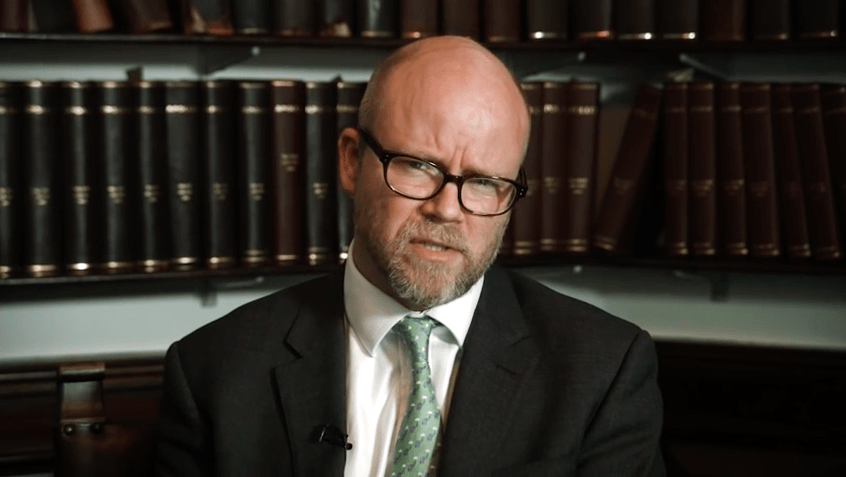Turmoil in the Middle East, a reshuffle rumoured at Westminster, and Toby Young is offending the liberal establishment. So far, 2018 doesn’t seem all that different from 2017. The occasion for the latest sputtering is the Speccie columnist’s appointment to the board of the Office for Students. The OfS is the new regulator of Britain’s universities and, according to the Department for Education website, will ‘promote students interests’. (The possessive apostrophe will presumably have to look out for itself.)
Paul Mason describes Young as a ‘Tory eugenicist and educational apartheid guru’. Danny Blanchflower declares him ‘totally unfit [and] unqualified’ and calls for his removal from a post he has only held for 24 hours. ‘Toby Young to help lead government’s new universities regulator,’ the Guardian‘s headline announces baldly, certain that readers will understand instantly that A Terrible Thing Has Befallen Us. At least Oxford academic Jonathan Healey had the good humour to rewrite Brian Clough: ‘I’m not saying Toby Young is the worst person for this job, but he’s in the bottom one.’
I don’t know Young, have never met him, and hold no brief for him. He is somewhere to the right of Torquemada, and in a long-term feud with my spiritual leader, Julie Burchill. He has written any number of things I find obnoxious, offensive, or risible. That’s his thing. He is the Jimmy Carr of punditry; Millwall in a Gieves & Hawkes suit. As Lynn Barber once summed up his career, ‘Toby Young has (despite his best efforts) made a success of himself.’
None of this should disqualify him from sitting on the board of the OfS. Labour politicians are solemnly informing Twitter that people who hold extreme views are unfit to serve in senior positions in public life. It’s impressive that they can still tweet with that giant beam in their eye. Yes, Young has expressed outrageous opinions. He’s a polemicist; provocation is his meat and mead. But he is also a prominent and experienced campaigner in the small education reform movement. He founded Britain’s first free school and has set up a further three since. He is director of a school choice charity, the New Schools Network, and has spent many years researching and writing about alternatives to the statist model of delivery. Spurning his insights because of his rhetoric is short-sighted and self-defeating.
Unless, of course, the objection is not really to his invective but his ideology. Would the coordinated hysteria be all that different if instead the government had appointed, say, Katharine Birbalsingh or Melanie Phillips? Is the clamour we hear perhaps not voices of concern but the nasal whine of special interests with their noses out of joint? The OfS board is neither dominated nor chosen by the education cartel – unions, activists, theorists – and that’s not surprising. If the government believes there’s enough of a problem to set up a new regulator, it’s hardly going to turn to those it considers to be the problem.
Toby Young sits outside the educational mainstream and that is the very reason he should be brought in and listened to. The untrained eye occasionally notices things routine-bound specialists miss. The fresh perspective can be bracing but cobwebs need to be blown away from time to time. The dissenting voice is sometimes right. If Young wants to have an impact, he will have to persuade enough of the 14 other board members, many of whom, going by their biographies, will take some convincing. This is no bad thing. It is an example of what the psychologist Daniel Kahneman calls ‘adversarial collaboration’, whereby individuals with sharply contrasting views explore them jointly and present honest conclusions about disagreements overcome and those which remain. Trench warfare is fine in politics but a hindrance to good policymaking.
As it happens, I’m not sold on the Office for Students. Its remit is to ‘promote choice and help to ensure that students are receiving a good deal for their investment in higher education… hold universities to account over issues such as vice chancellor pay and free speech… [and] the quality of teaching they provide’. What constitutes ‘a good deal’? Should universities charge more for a degree in theatre studies or divinity? Must all classics students be employed translating Callimachus within six months of graduating? Will there be a fine for teaching EL James over Henry James? Perhaps disciplines like engineering or mathematics can be regulated like the output of a gas meter but a liberal education is something more elusive, more intangibly enriching.
I’m not a Tory; I believe in the free market. If universities are providing a bad service, students and parents can vote with their wallets. If budding scholars want to pursue personally fulfilling but income-limiting qualifications (full disclosure: MA Film Studies, MSc Political Communication), that is their choice. Safeguarding free speech is the closest the OfS comes to a raison d’être but even that could be addressed by denying public money to institutions that impose or facilitate restrictions on speech except in accordance with the law.
But since we have an OfS, it may as well do something worthwhile and make universities more responsive to students’ needs and better tailored to a changing economy. In that task, it will be better served by Toby Young, who may sometimes be objectionable, than by the sort of right-on reactionary who surveys declining standards and systemic failure and objects to none of it.







Comments